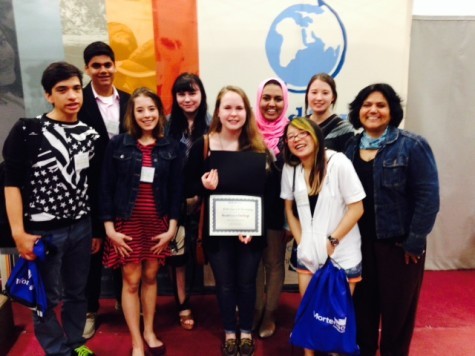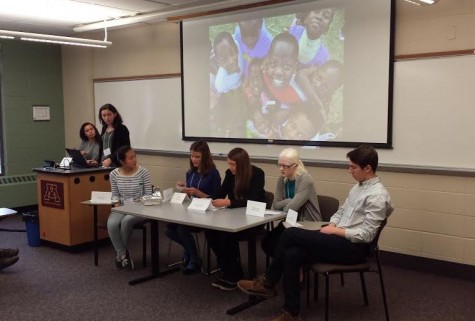World Savvy suspended as program turns from competition
Although the St. Paul Academy entered the World Savvy program when it was still a lively competition, it has changed from a showcase of work to a new system of changing the history classroom. SPA wants an outlet to exhibit research, not an a handbook on how to run a classroom.
January 7, 2016
Throughout the years, Saint Paul Academy World Savvy teams have explored topics and brainstormed solutions for issues afflicting the globe. After a school year of studying world problems, their work culminated in spring at the World Savvy competition at the University of Minnesota. There, surrounded by a professors, public officials, and other competitors, World Savvy students presented their research, participated in discussions about solving pertinent global problems, and often won first place for their work. This year, however, the SPA World Savvy team is suspended due to the program’s turn away from competition.
“We will not be participating in the World Savvy competition since it seems the process and focus of the program has shifted more into the classroom versus an academic competition. After advising and SPA doing so well for 5 consecutive years, I am sad to let it go,” the Saint Paul Academy World Savvy adviser Dr. Sushmita Hodges, the program’s adviser, said.
Hodges explained that with the change from World Savvy challenge to World Savvy conference, there was no big reward for her Savvy students after a year of hard work. The time commitment and cost of participating would no longer be justified.
A brief history of the history department’s World Savvy competition:
Although there will not be assembly announcements of another World Savvy win this year, the teams document a happy history from prior years of participation.
St. Paul Academy and Summit School’s first appearance on the World Savvy stage at the University of Minnesota landed them in second place in the World Affairs competition. The 2011 team tackled the topic of food security, focusing on the use of GMOs to achieve global food stability and using countries like Bangladesh as case studies for their solutions. Minneapolis mayor and R.T. Ryback and Minnesota Secretary of State attended the conference, witnessing the victory and providing insight as keynote speakers.

The Water Warriors, the 2014 World Savvy competitors, won second place for a project on solving water insecurity in different environments.
Empowering women became the focus of the 2012 SPA World Savvy team’s problem-solving presentation. The team’s approach to presenting as a panel of delegates from a variety of NGOs, MNCs, and the UN brainstorming how to bring entitle and encourage women in developing countries to take control of decision-making for their families. The team ultimately presented the win-win institution of microcredit to enfranchise women across the world to face the problem of wanting and wasteful husbands. They drafted a detailed knowledge-to-action plan with analysis of how to empower local people affected by human trafficking. Their efforts secured them third place at the competition.
After proposing how to patch the gender split in the global world, the team tackled how to close the gap between divide between standards of rural and urban education around the world. The team zoomed in on how economic circumstances can affect education in rural Indonesia, urban China, and Minnesota. The 2013 team secured first place for their ideas about equality across the global education initiative.
As a new wave of global awareness education was just beginning to form for the World Savvy organization, the 2014 Water Warriors probed the globe for effective solutions to water insecurity. Their presentation featured a mock news report on water security in the United States, Australia, and Bangladesh. They reported the different problems, both contamination and inadequate storage, and solutions, making water a good that the entire population del responsible to sustain, by assuming the roles of field workers and politician handling water supplies. Their work won them second place.
The 2015 First Aid Vectors took the timely topic of Ebola support in tandem with the classical controversy over HIV/AIDS management to create a first place presentation for SPA’s last year of World Savvy competition. Each team member was cast as one of the players in the world’s battle against disease in both developing and developed countries. As UN representatives, Ebola survivors, and doctors searching for cures to both AIDs and Ebola, the First Aid Vectors used evidence from two historic outbreaks to claim that “we need to stop thinking that these diseases could never affect us to find solutions to these global epidemics”.

Themes for solving the variety of problems the SPA World Savvy teams faced including eliminating stigmas, preserving and adjusting cultural practices to create cohesive global solutions, and ensuring the global conscience feels equal responsibility for protecting its resources and inhabitants.
The participants in the program walked away with a new sense of world savviness and a spring in their step, but now globally-oriented students must look elsewhere for a critical-thinking exercise. Fortunately, the history department’s curriculum naturally combines historical facts with world awareness. Model United Nations and other global citizenship conferences at the University of Minnesota. For now, students of World Savvy can be consoled that the history of the program will remember them well.